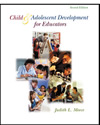| achievement motivation | An internal mechanism that energizes, directs, and terminates achievement behavior; explained by theorists variously as an enduring psychological need, an environmentally activated state, or a set of cognitions and beliefs.
|
 |
 |
 |
| androgyny | A blend of masculine and feminine traits that develop gradually as young people mature and become more flexible in their attitudes toward gender-typed behaviors through encounters with new activities and interests.
|
 |
 |
 |
| attachment | The close, affective relationship formed between a child and one or more caregivers.
|
 |
 |
 |
| emotional competence | The understanding, expression, and regulation of emotions. Also called emotional intelligence.
|
 |
 |
 |
| empathy | The ability to know and feel another person's emotional state.
|
 |
 |
 |
| entity theory of ability | A theory of intelligence, proposed by Dweck, whereby students believe their ability level is fixed and cannot be improved through practice or effort; contrast with incremental theory of ability.
|
 |
 |
 |
| ethnic identity | Refers to one's sense of self concerning racial or ethnic group membership.
|
 |
 |
 |
| extrinsic motivation | A need to learn or act that rises from external contingencies, such as winning an award, parental demands, or to achieve a high grade; contrast with intrinsic motivation.
|
 |
 |
 |
| gender constancy | The understanding by around age 4 or 5 that one's sex is permanent and cannot be altered by changes in clothing, hairstyle, or activities.
|
 |
 |
 |
| gender-role socialization | The process by which children learn the attitudes and behavior that society defines as appropriate for their gender; see gender-typed behavior. Same as sex-role socialization.
|
 |
 |
 |
| gender schema | Children's understanding of gender and gender-role expectations.
|
 |
 |
 |
| ideal self | The image of the self created during middle childhood that is developed by comparing one's real self to a set of desired characteristics including the expectations, values, and ideals of peers and adults.
|
 |
 |
 |
| identity | (1) In Piaget's theory, one of three basic mental operations including negation and compensation needed to perform conservation tasks; involves an understanding of cognitive constancy, that people, objects, and quantities remain unchanged despite changes in appearance. (2) In Erikson's theory, the fifth stage of psychosocial development when adolescents commit themselves to a set of beliefs, values, and adult roles in forming a basic sense of self. If adolescents are unable to explore alternative roles and options, they will experience a parallel internal state of role confusion; see Table 7.1.
|
 |
 |
 |
| incremental theory of ability | A theory of intelligence, proposed by Dweck, whereby students believe their ability level can improve through a greater investment of effort or by trying different strategies; contrast with entity theory of ability.
|
 |
 |
 |
| intrinsic motivation | A desire to learn or act that arises from internal sources of curiosity, interest, enjoyment, and innate strivings for mastery and growth; contrast with extrinsic motivation.
|
 |
 |
 |
| learned helplessness | A feeling of helplessness that develops when one encounters difficult or failure, especially in situations when one does not have control. This reinforces low self-confidence.
|
 |
 |
 |
| psychological self | A developmental gain during which adolescents begin to understand that they have an inner self-thoughts and feelings hidden from others unless they share them.
|
 |
 |
 |
| self-concept | The beliefs, attitudes, knowledge, and ideas people develop or construct about their personality, physical skills, and mental abilities; see self-esteem.
|
 |
 |
 |
| self-conscious emotions | Feeling such as pride, shame, and guilt requiring a connection between one's actions and feelings that involve an evolving sense of self, generally emerges between the ages of 2 and 4.
|
 |
 |
 |
| self-control | Being able to control negative emotions, persist at difficult and challenging activities, and inhibit impulses.
|
 |
 |
 |
| self-efficacy | In motivation theory, an individual's judgment of personal ability to perform a task given the skills he or she possesses and the circumstances he or she faces; according to Bandura, shaped by prior experience, peer models, and corrective feedback.
|
 |
 |
 |
| self-esteem | Personal evaluation of one's own traits, abilities, and characteristics; a judgment of one's own worth, value, or competence; see self-concept.
|
 |
 |
 |
| social referencing | The process of incorporating facial cues into response sequences in infants.
|
 |
 |
 |
| Strange Situation | Ainsworth procedure for assessing behaviors of caregivers and children; used to establish quality of attachment.
|
 |
 |
 |
| temperament | An infant's characteristic style of responding to the environment and includes activity level, predictability, and emotionality; believed to be early component of personality development.
|



 2002 McGraw-Hill Higher Education
2002 McGraw-Hill Higher Education